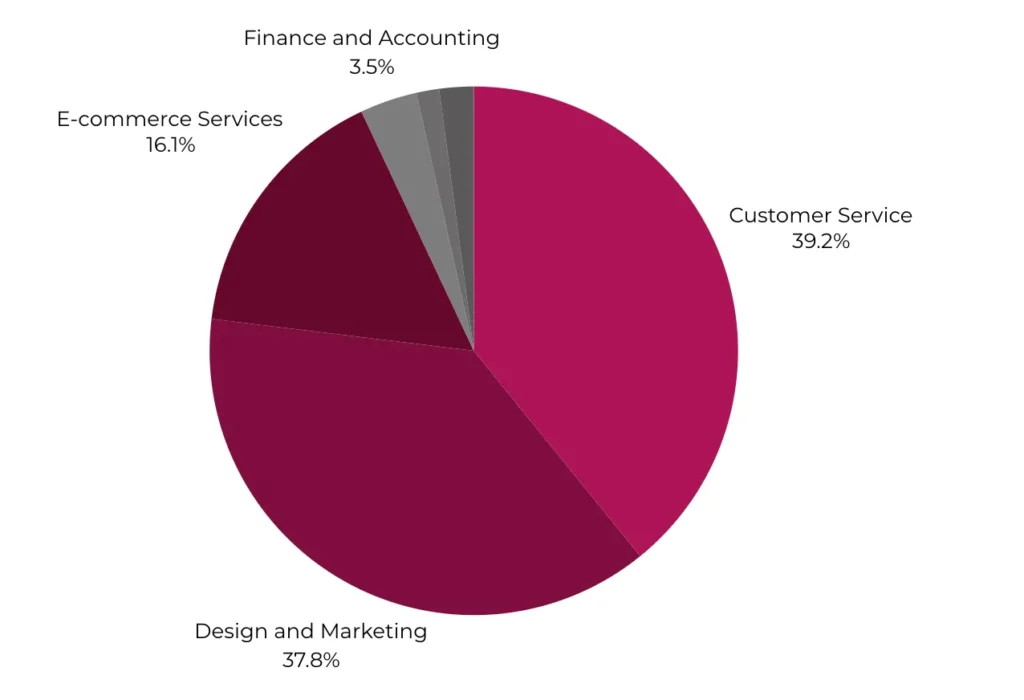A Deep Dive into the BPO Industry in the Philippines: Trends, Drivers, and Technological Impact
The BPO industry in the Philippines has transformed over the years, solidifying its position as a global leader in outsourcing services. As we explore the current trends, key drivers of growth, challenges, and the impact of technological advancements, it becomes clear why the BPO Industry Philippines offers is a highly competitive environment that continues to excel in this sector.
Current Trends in the Philippines’ BPO Industry
The Philippines’ BPO industry trends show a continuous rise in market value. In 2023, the industry was worth $35.4 billion, and projections show it will grow to $37.87 billion in 2024, with a 7% CAGR. This steady growth reflects the strong demand for outsourcing services and the country’s ability to meet it efficiently.
Design & Marketing dominate the outsourcing market with a 30% share, followed by Retail & E-commerce at 14%. The increasing reliance on digital platforms and e-commerce has driven the need for specialized outsourcing services, positioning the Philippines as a go-to destination for these needs.
Most Outsourced Business Processes in the Philippines (2023)
A 2023 survey involving 143 companies with interests in outsourcing to the Philippines, revealed that customer service is the most sought-after outsourced business process, with 39.2% of companies indicating a preference for it. Within customer service, voice-related services like phone support are particularly popular. Design & marketing services come next, attracting 37% of the companies, followed by E-commerce services at 16.1%, finance & accounting services at 3.5%, and back office functions at 1.4%.

Key Drivers of Growth in the BPO Industry Philippines
Several factors drive the growth of the BPO industry in the Philippines:
- English Proficiency and Skilled Labor: The Philippines boasts a high English proficiency level, ranking 20th globally and 2nd in Asia. With around 350,000 college graduates annually, the country has a large pool of skilled labor, making it an attractive destination for multinational companies.

Asia’s English Proficiency Ranking. Source: KDCI Outsourcing - Cost-Effective Labor: Compared to other outsourcing destinations in APAC, the average cost of labor in the Philippines is significantly lower. This cost advantage, combined with high-quality service, makes the Philippines a preferred choice for outsourcing.
- Government Support and Incentives: The Philippine government provides substantial support and incentives to the BPO sector, including tax breaks and infrastructure development assistance. These incentives attract foreign investments and encourage the expansion of local BPO firms.
- Cultural Compatibility: The cultural affinity with Western countries, particularly the U.S., ensures seamless communication and interaction, enhancing the overall customer experience.
Challenges Facing the BPO Industry in the Philippines
Despite its successes, the BPO Industry Philippines faces several challenges:
- Technological Adaptation: While technological advancements like AI and automation offer significant benefits, they also pose challenges. BPO companies must continuously invest in upskilling their workforce to handle new technologies and maintain competitiveness.
- Economic Volatility: The global economic landscape is ever-changing, and fluctuations can impact the demand for outsourcing services. BPO firms need to remain adaptable and innovative to navigate these uncertainties.
- Infrastructure Development: While major cities like Metro Manila and Cebu City have well-developed infrastructure, other regions may lack the necessary facilities to support BPO operations. Continuous investment in infrastructure is crucial for sustained growth.
Impact of Technological Advancements on the BPO Industry Philippines
Technological advancements are reshaping the BPO landscape in the Philippines. Automation tools like robotic process automation (RPA) and AI are optimizing workflows and increasing efficiency. BPO companies are integrating cloud computing to enhance scalability and data security, ensuring they meet the evolving needs of their clients.
Moreover, the adoption of omnichannel customer support systems enables seamless interactions across various communication platforms, improving customer satisfaction and loyalty. As BPO companies continue to embrace these innovations, they enhance their ability to deliver high-quality services and maintain a competitive edge.
Conclusion
The BPO industry in the Philippines is growing steadily, driven by factors such as skilled labor, cost advantages, government support, and cultural compatibility. While challenges exist, the industry’s ability to adapt to technological advancements and economic shifts ensures its continued growth and relevance in the global market. By staying ahead of trends and leveraging its strengths, the Philippines remains a top destination for outsourcing services.

